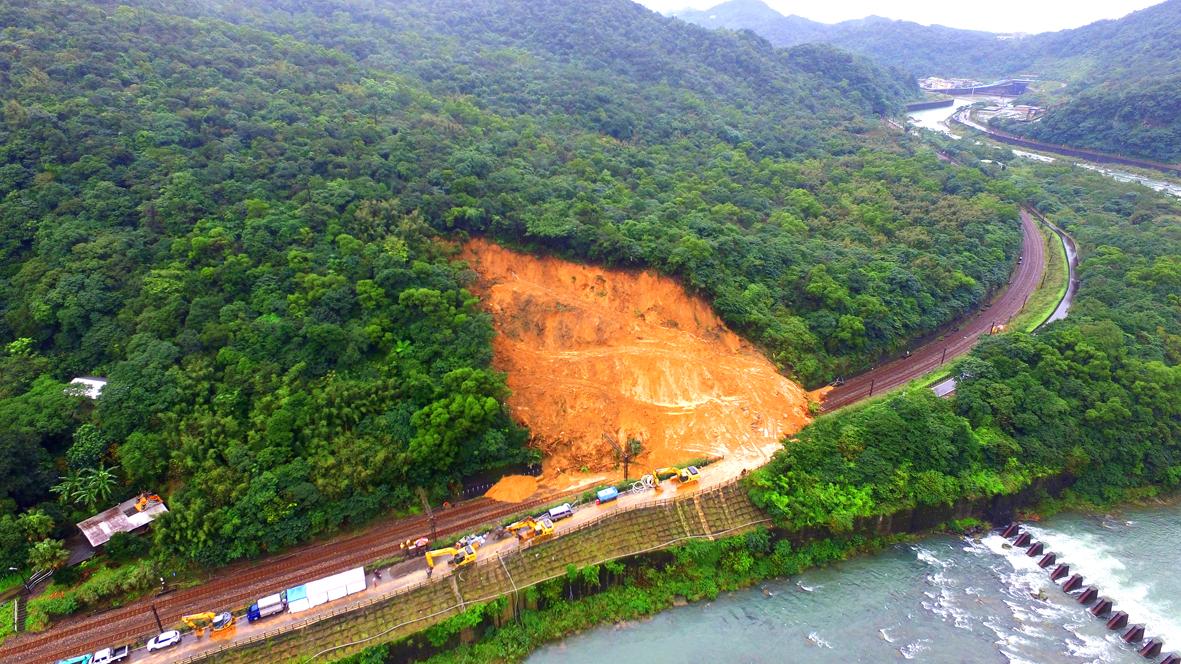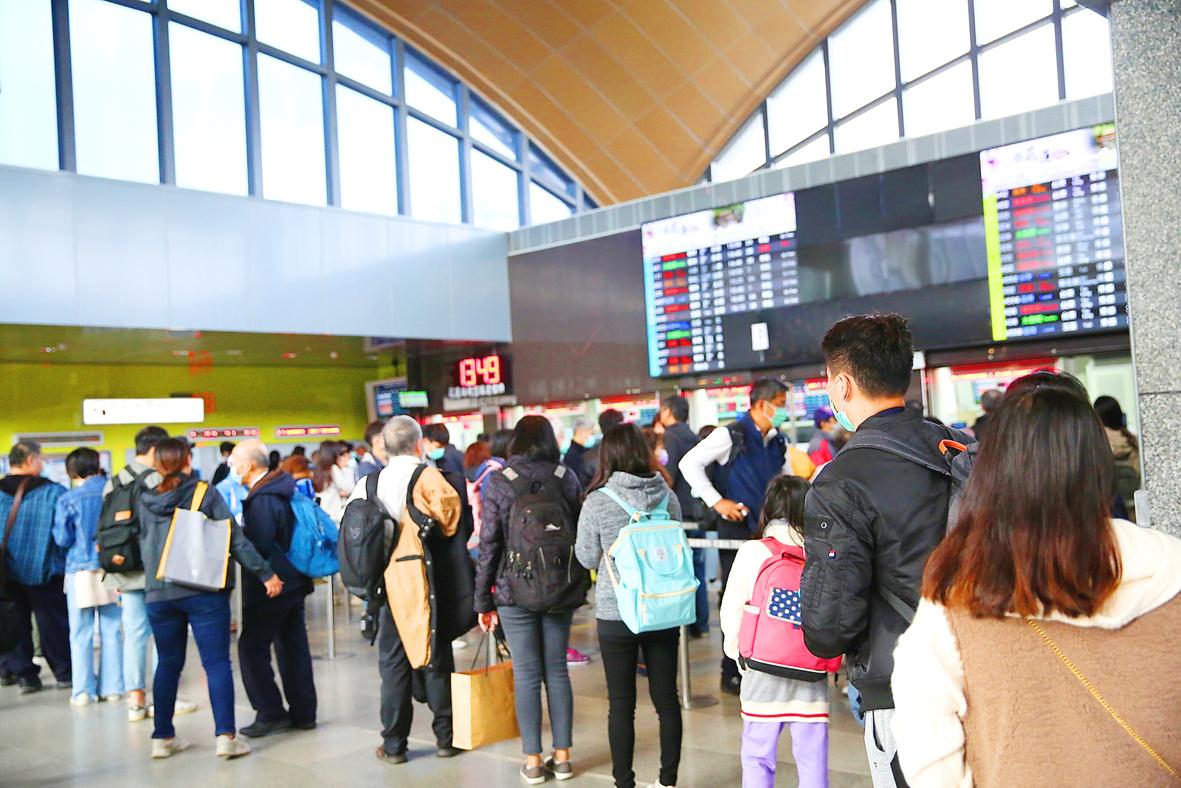About 30,000 people yesterday were diverted to intercity buses after a landslide in northeastern Taiwan the day before damaged a railway line and resulted in disruptions to services provided by the Taiwan Railways Administration (TRA).
The TRA said it is continuing to liaise with bus companies and hopes to increase the number of trips to expedite the transportation of passengers.
The landslide deposited 3,800m3 of rock, dirt and debris onto a section of tracks between Rueifang (瑞芳) and Houtong (猴硐) stations in New Taipei City at about 9am on Friday, disrupting transportation.

Photo courtesy of the Taiwan Railways Administration
One train traveling near the site barely avoided running into the towering mound of debris, stopping about 30m from where the side of a hill alongside the tracks had collapsed, after being alerted by TRA staff monitoring the area, the agency said.
TRA Division of Construction Affairs Deputy Director Chen Tsung-hung (陳宗宏) yesterday said that the TRA was working to remove the obstacles from the railway line, despite heavy rain.
Weather permitting and without further landslides, the TRA expects to resume one-way transportation through the affected area by Tuesday at the earliest, he added.

Photo: Wang Chin-yi, Taipei Times
People with tickets time-stamped from 8:30am on Friday for routes that would have taken them through the affected area would be eligible for a refund up until the day the obstacles have been removed, the TRA said.
People whose journeys have been delayed by the landslide by at least 45 minutes can visit any TRA station nationwide for a refund within a year, it added.
Those who had not reserved seats or did not experience such a delay can ride the same class of train once within one year, the TRA said.
People with electronic tickets can have their swipe-in information removed at an information office, while those with a season pass ticket would have their season pass extended by one day, it said.
The Directorate-General of Highways yesterday said it has asked major bus companies to divert buses from other routes to assist in transporting passengers to and from areas that are cut off by the landslide.
As of Friday, Metropolitan Transport Corp (大都會客運), running from New Taipei City’s Sindian District (新店) to Yilan County, had assisted with 128 trips and carried up to 1,701 passengers, while Kuokuang Bus (國光客運), running from the Yuanshan (圓山) area to Yilan County, had run 67 trips and carried up to 2,084 passengers, the highway authority said yesterday.
Kamalan Bus (葛瑪蘭客運) drove 537 trips and assisted with ferrying 15,464 passengers from New Taipei City’s Banciao District (板橋) to Yilan County, while Capital Bus (首都客運), running two routes — from the Taipei City Hall Bus Station to Yilan County and from Banciao to Hualien County — ferried 4,950 passengers in 165 trips, it said.
Taipei Bus (臺北客運), embarking from Taipei’s Nangang District (南港) to Hualien County, helped transport 213 passengers over four trips, while UBus (統聯客運), also on the same route, helped ferry 102 passengers over four trips, the directorate said.
The highway authority has also arranged for Keelung Bus Co (基隆汽車客運) to divert four buses to drive along the 808 bus’ original route, assisting with the transportation of 840 passengers, as of Friday.
Additional reporting by CNA

Intelligence agents have recorded 510,000 instances of “controversial information” being spread online by the Chinese Communist Party (CCP) so far this year, the National Security Bureau (NSB) said in a report yesterday, as it warned of artificial intelligence (AI) being employed to generate destabilizing misinformation. The bureau submitted a written report to the Legislative Yuan in preparation for National Security Bureau Director-General Tsai Ming-yen’s (蔡明彥) appearance before the Foreign Affairs and National Defense Committee today. The CCP has been using cognitive warfare to divide Taiwanese society by commenting on controversial issues such as Taiwan Semiconductor Manufacturing Co’s (TSMC, 台積電) investments in the

HELPING HAND: The steering committee of the National Stabilization Fund is expected to hold a meeting to discuss how and when to utilize the fund to help buffer the sell-off The TAIEX plunged 2,065.87 points, or 9.7 percent, to close at 19,232.35 yesterday, the highest single-day percentage loss on record, as investors braced for US President Donald Trump’s tariffs after an extended holiday weekend. Amid the pessimistic atmosphere, 945 listed companies led by large-cap stocks — including Taiwan Semiconductor Manufacturing Co (TSMC, 台積電), Hon Hai Precision Industry Co (鴻海精密) and Largan Precision Co (大立光) — fell by the daily maximum of 10 percent at the close, Taiwan Stock Exchange data showed. The number of listed companies ending limit-down set a new record, the exchange said. The TAIEX plunged by daily maxiumu in just

INVESTIGATION: The case is the latest instance of a DPP figure being implicated in an espionage network accused of allegedly leaking information to Chinese intelligence Democratic Progressive Party (DPP) member Ho Jen-chieh (何仁傑) was detained and held incommunicado yesterday on suspicion of spying for China during his tenure as assistant to then-minister of foreign affairs Joseph Wu (吳釗燮). The Taipei District Prosecutors’ Office said Ho was implicated during its investigation into alleged spying activities by former Presidential Office consultant Wu Shang-yu (吳尚雨). Prosecutors said there is reason to believe Ho breached the National Security Act (國家安全法) by leaking classified Ministry of Foreign Affairs information to Chinese intelligence. Following interrogation, prosecutors petitioned the Taipei District Court to detain Ho, citing concerns over potential collusion or tampering of evidence. The

‘COMPREHENSIVE PLAN’: Lin Chia-lung said that the government was ready to talk about a variety of issues, including investment in and purchases from the US The National Stabilization Fund (NSF) yesterday announced that it would step in to staunch stock market losses for the ninth time in the nation’s history. An NSF board meeting, originally scheduled for Monday next week, was moved to yesterday after stocks plummeted in the wake of US President Donald Trump’s announcement of 32 percent tariffs on Taiwan on Wednesday last week. Board members voted to support the stock market with the NT$500 billion (US$15.15 billion) fund, with injections of funds to begin as soon as today. The NSF in 2000 injected NT$120 billion to stabilize stocks, the most ever. The lowest amount it